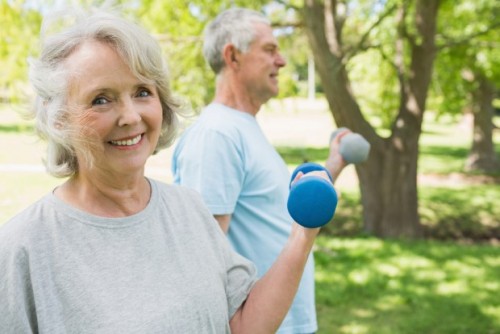Did you know that January is National Weight Awareness Month? Many of us may have set a New Year’s Resolution to go to the gym more, walk more, and eat healthier, but we don’t often think about obesity in older adults. However, carrying around excess weight can have detrimental effect on Seniors. Not only can it shorten their lifespan it can dramatically decrease their quality of life as well. Weight gain is not a natural part of the aging process. In fact, historical data shows that Americans’regardless of their age’are putting on more weight now than ever before. A study published by the American Journal of Clinical Nutrition found that obesity in older adults is a growing problem here in the United States. In 1991 14.7% of individuals 60 to 69 years of age were classified as obese. Fast-forward just nine years and that figures jumped up to 22.9%. That’s an 8.2% increase or roughly 1% per year.
Obesity in older adults can lead to a host of health problems which decrease an aging individual’s quality of life. Multiple studies have found that obese individuals 55 and older are at much higher risk of:
- Complications from arthritis
- Heart disease
- Stroke
- Diabetes
- High blood pressure
So, what can you do to keep your loved one healthier?
Stay Active
Staying active can keep you feeling and looking your best at every stage of your life. An active lifestyle is especially important’for Senior health’because regular exercise can help prevent heart disease, diabetes, and certain forms of cancer, and it can also reduce pain associated with arthritis. By improving balance, flexibility, endurance, and strength, older adults can stay healthier longer. Here are some exercise ideas for older adults:
- Walking
- Water Aerobics
- Resistance with light weights or elastic bands
- Leg Raises
- Toe and Chair Stands (which helps with balance and reduces the risk of falls)
- Upper and Lower Body Stretching.
Diet
As people age, their diets may need to change, especially if their diets are not well-balanced. Generally, doctors will recommend a well-balanced diet for older adults, meaning that they should eat a variety of fruits, vegetables, proteins and whole grains to maintain and improve overall health. According to Ruth Frechman, registered dietitian and spokesperson for the American Dietetic Association, in addition to eating a healthful variety of foods, there are specific things a caregiver can incorporate into their their loved one’s diet to boost his or her health.
Prepare meals rich in these nutrients:
- Omega 3 fatty acids – The acids have been proven to reduce inflammation, which can cause heart disease, cancer and arthritis.’They can be found in flax seeds and flax seed oil, walnuts, canola oil, and different types of fish. Your older relative should have foods rich in this nutrient twice per week. If this is impossible, check with their doctor to see if an Omega 3 supplement would be beneficial.
- Calcium – The need ‘for calcium’ increases as people age. This is primarily to preserve bone health. One added benefit of calcium is that it helps to lower blood pressure.The World Health Organization (WHO) recommends that adults over the age of 50 get at least 1200 milligrams per day of calcium equal to about four cups of fortified orange juice, dairy milk, or fortified non-dairy milks such as almond or soy. Leafy greens like kale and turnip greens are also great sources of absorbable calcium. Many people find it challenging to consume this much calcium per day by eating and drinking, so check with your loved one’s doctor to see if he or she should take a calcium supplement.
- Limit sodium content – For those with high blood pressure, one’of the most important things caregivers can do to help reduce a loved one’s hypertension is to prepare foods that are low in sodium. Most people are surprised to find out that added table salt accounts for only a small percent of sodium content in food. Frozen, processed and restaurant foods are typically extremely high in sodium, and should be avoided or only be a very small part of the diet. Fresh and frozen fruits and vegetables, dry beans, unsalted nuts and nut butters, and grains like brown rice and oats are all foods that are naturally low in sodium, so try and incorporate them as much as possible in their diet.
- Hydrate – As people age, they do not get thirsty very often, even though their bodies still need the same amount of liquids. If you notice that your loved one is not drinking liquids very often, make sure that you provide them with it. If they do not feel thirsty, chances are they may not think about drinking a glass of water.

